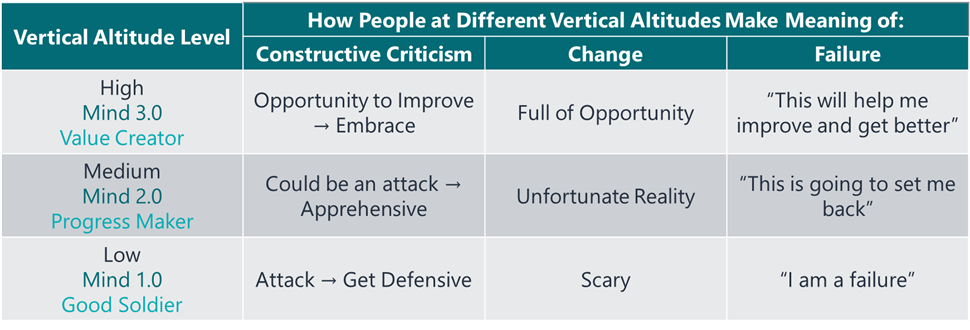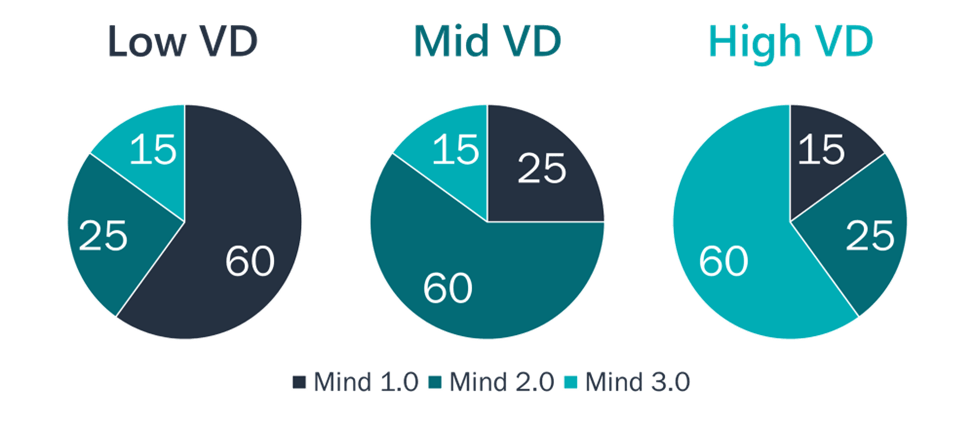Vertical development is a form of development that is focused on improving our internal operating such that we make meaning of our world in more cognitively and emotionally sophisticated ways.
In fact, developmental psychologists have identified that there are three different level of vertical development. At each level, people make meaning of their world differently, and thus operate differently across similar situations.
For example:

People who operate primarily at the Mind 1.0 level are “Good Soldiers.” They are inclined to play it safe and are often passive in their environments. 64% of adults operate at this level.
People who operate primarily at the Mind 2.0 level are “Progress Makers.” They are generally goal- and outcome-oriented. They want to stand out, advance, and get ahead. 35% of adults operate at this level.
People who operate primarily at the Mind 3.0 level are “Value Creators.” They aren’t outcome-oriented. They are purpose-oriented. They are focused, not on their safety or success, but on helping to ensure they add value to a purpose that is bigger than themselves.
Window of Tolerance
As one increases in their vertical altitude, they expand their window of tolerance for things like change, pressure, failure, risk, uncertainty, complexity, being wrong, having problems, etc. This allows them to navigate their environments, and chaotic or challenging moments, with clarity of mind, grace, and effectiveness.
Center of Gravity
There are two things that we know about vertical development:
- People, at different times and for various reasons, can operate at different vertical development altitudes.
- But, people usually have a default level that they primarily operate at. This is called their “center of gravity.
Thus, we can have people with different vertical development profiles that might resemble the following:

This suggests that those who are:
- Less vertically developed, have a narrow window of tolerance and get thrown outside of their optimal cognitive and emotional range rather frequently. But, there are select times and situations (e.g., low stress) where they can operate more as a Value Creator.
- More vertically developed, have a wider window of tolerance and rarely get thrown outside their optimal cognitive and emotional range. But, there are select times and situations (e.g., extreme stress or connection to past trauma) where they can operate more as Progress Maker or Good Soldier.
Elevating Our Being
Understanding these fundamentals, it becomes easy to see that there are two ways to think about elevating our being:
- We can shift from one level (e.g., Mind 1.0) to a higher level (e.g., Mind 2.0). (If you want information on how to do that, check out this article: Vertical Development: How to Upgrade Your Operating System)
- We can focus on spending a higher percentage of our time at the Mind 3.0 – Value Creator level. (This is the focus of the rest of this article)
Spending a Higher Percentage of Our Time at the Mind 3.0 – Value Creator level
If we want to spend a higher percentage of our time at the Mind 3.0 level, we have got to:
- Do things to expand our window of tolerance
- Learn skills to bring us back into the center of our window of tolerance (being “centered”) when we find ourselves one the edge or outside our window of tolerance
Allow me to provide ideas for both.
Expanding Our Window of Tolerance
There are several ways we can expand our window of tolerance:
- Exercise our mindfulness (combination of presence and awareness) muscles. One of the best ways to do this is through meditation. Meditation is the practice of having your mind drift away from the present, and then reigning it back in. The more we develop our ability to do that, we will be expanding our window of tolerance.
- Engage in therapy to heal from our past trauma. When someone experiences trauma, the body’s natural reaction is to protect itself in the present and the future. The consequence of this is a shrinking of our window of tolerance. As we heal from trauma, we will expand our window of tolerance.
Developing Skills to Stay Centered
There are a wide variety of ways people can pull themselves back to the center of their window of tolerance. We generally find that some approaches work better than others. These include, but are not limited to the following:
- Meditation (see above)
- Connect to your breathing
- Exercise
- Sleep
- Ask introspective questions (e.g., Am I being inward or outward; What self do I want to bring to this situation?)
One of the best books I have read on this topic is Positive Intelligence by Shirzad Chamine. If you are serious about developing the skills to stay centered, I couldn’t recommend his book and programming more.











One Response
This is one of my favorite articles,it is here——“Expanding Our Window of Tolerance”and“Developing Skills to Stay Centered”,beacuse this enlightens me,As a thank you, I shared a book with Han Yan,